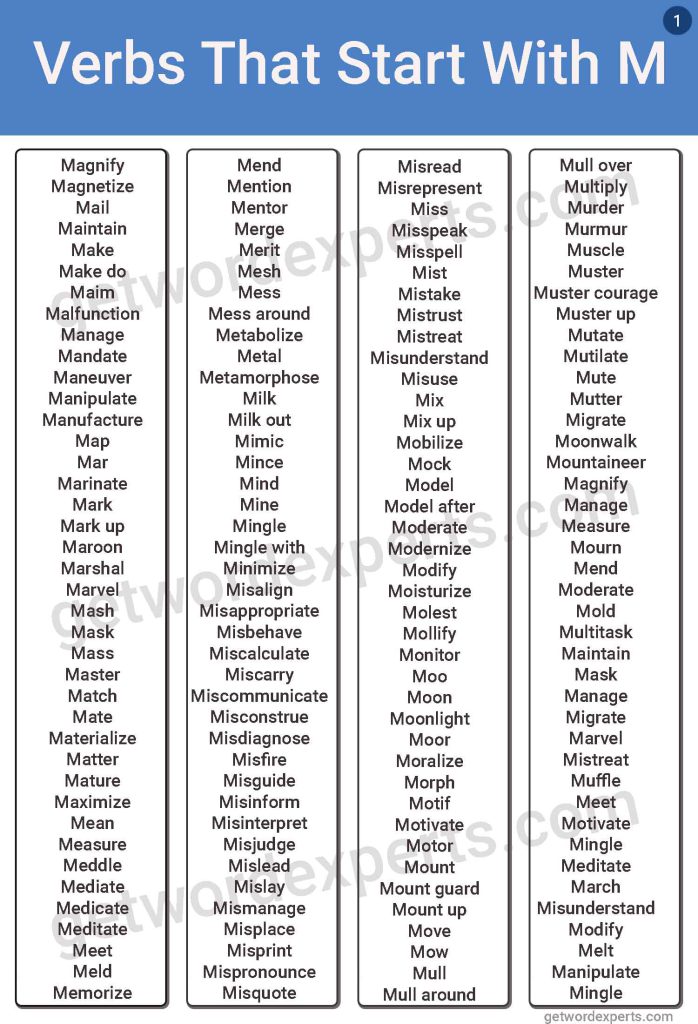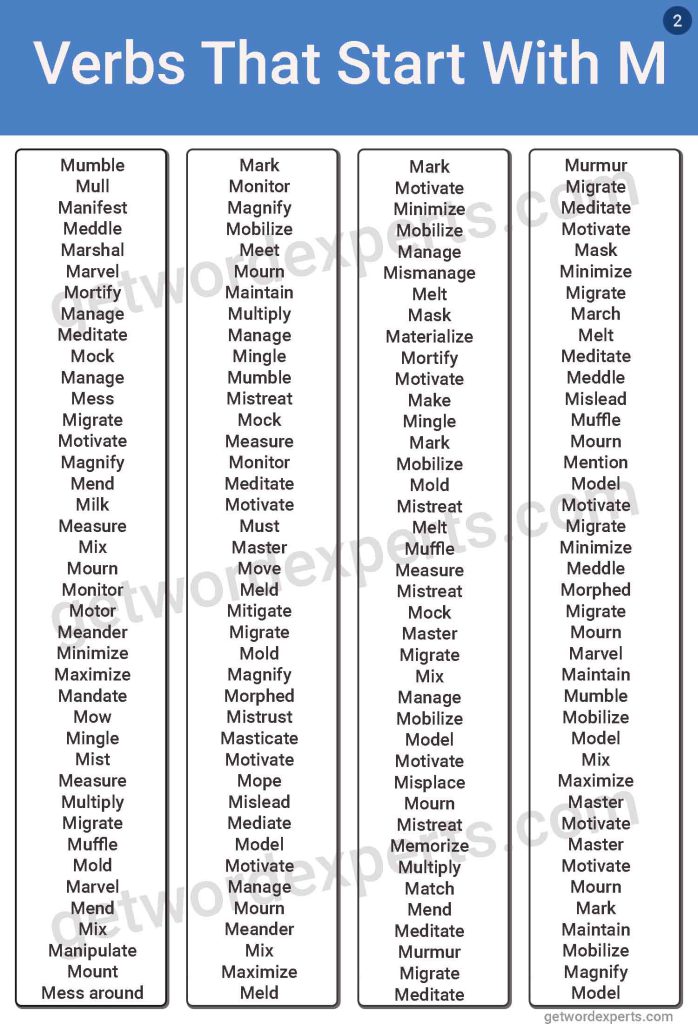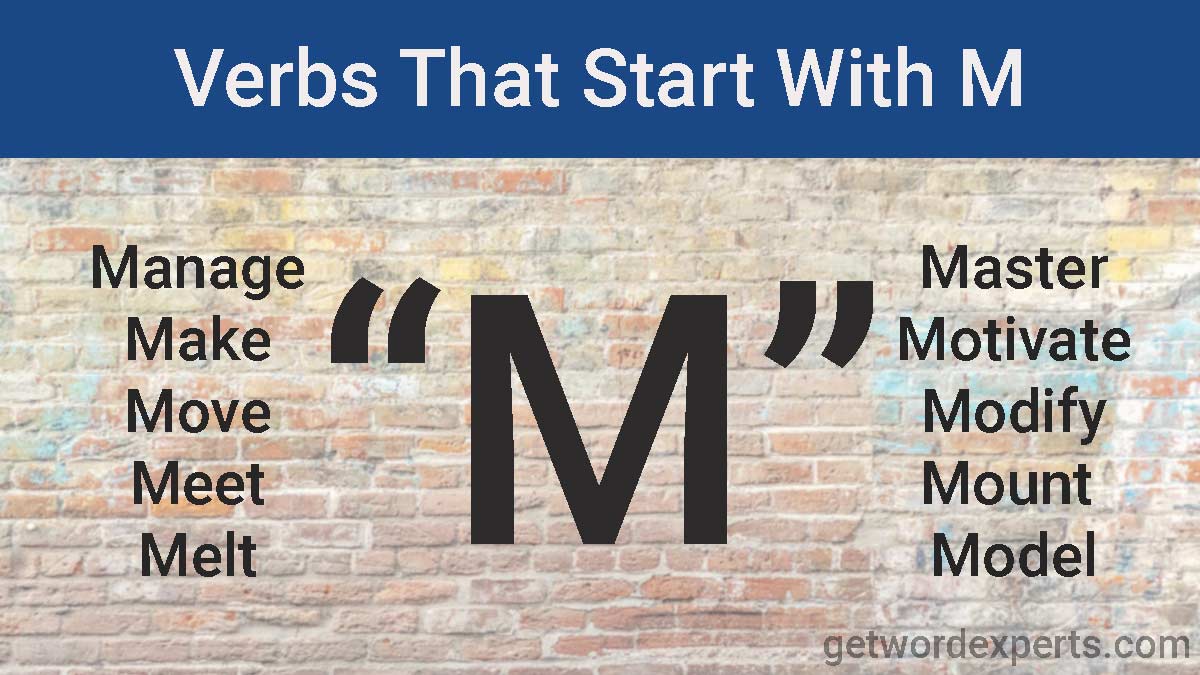Common Verbs That Start With M
Verbs are the action words in sentences that describe what the subject is doing. Verbs that start with the M are quite common and versatile. These verbs can be found in everyday conversations, written text, and various forms of media. In this section, we will explore some common verbs that start with “M” and their practical usage in daily life.
Everyday Usage
Many verbs starting with “M” are used in daily interactions. Understanding these verbs helps us communicate clearly and effectively. Here are some common “M” verbs and their uses:
| Verb | Meaning | Usage in Sentence |
| Make | To create or produce something | She loves to make handmade cards for her friends. |
| Manage | To control or handle something | He has to manage his time better to finish his homework. |
| Move | To change position or place | They decided to move to a new house next summer. |
| Meet | To come into the presence of someone | We will meet at the park after school. |
| Maintain | To keep in good condition | It’s important to maintain a balanced diet for good health. |
| Mix | To combine two or more things | She mixed the ingredients to make a cake. |
| Mend | To repair something | He mended his torn jacket before heading out. |
| Mention | To refer to something briefly | She mentioned her plans during the meeting. |
| Multiply | To increase in number | The population has multiplied over the last decade. |
| Match | To pair things together | These shoes match perfectly with your outfit. |
| Measure | To ascertain the size, amount, or degree | She measured the ingredients for the recipe carefully. |
| Monitor | To observe or check regularly | The doctor will monitor your progress after the surgery. |
| Move | To change position or place | They decided to move to a new house next summer. |
| Meditate | To focus or think deeply | She meditates every morning to clear her mind. |
| Motivate | To inspire someone to take action | The coach motivated the team to push harder in the second half. |
Verbs that start with “M” are essential in everyday language, helping us organize tasks and interact with others. For example, “make” is used for creating things like meals or progress, while “manage” involves handling tasks, time, or resources. “Move” covers both physical actions, like moving furniture, and abstract ones, like moving forward in life. “Meet” is useful in social settings, whether meeting friends or expectations, and “maintain” focuses on keeping things in good condition, such as health or relationships. Using these verbs effectively can improve how you communicate various actions and ideas.
Action Verbs that Start with M With Examples
Action verbs that start with “M” are vital for adding clarity and movement to your writing. These verbs convey purposeful actions, making your sentences more dynamic and engaging. They are commonly used in everyday tasks, business, and personal interactions. Below is a list of some key “M” action verbs, their meanings, and examples of how they are used in sentences.
| Verb | Meaning | Usage in Sentence |
|---|---|---|
| Make | To create or produce something | She loves to make homemade bread on weekends. |
| Manage | To control or handle tasks | He manages a large team at work efficiently. |
| Move | To change position or place | They moved the meeting to a later time. |
| Motivate | To inspire someone to take action | The teacher motivates students to reach their goals. |
| Measure | To determine the size, amount, or degree | She measured the room before buying new furniture. |
| Mix | To combine different elements | He mixed the ingredients for the cake batter. |
| Match | To pair things that are alike | Her skills match the job requirements perfectly. |
| Monitor | To watch or check regularly | The doctor will monitor the patient’s recovery closely. |
| Multiply | To increase in number | The company’s profits multiplied over the past year. |
| Maintain | To keep something in good condition | It’s essential to maintain a healthy lifestyle. |
By incorporating these action verbs into your vocabulary, you can describe activities and actions with greater precision and energy. They not only help in conveying tasks but also in making your writing or speech more vivid and direct.
Transitive Vs. Intransitive
Verbs are the action words in sentences. They describe what the subject is doing. Verbs can be classified into two main categories: transitive and intransitive. Knowing the distinction ensures your sentences are both clear and grammatically sound.. Let’s dive into some interesting verbs that start with ‘M’ and explore their usage as transitive and intransitive verbs.
Transitive M Verbs
Transitive verbs require a direct object to convey a complete thought. They answer the question “what?” or “whom?”. Here are some transitive verbs that start with ‘M’:
:
| Verb | Meaning | Usage in Sentence |
|---|---|---|
| Make | To create or produce something | She made a cake. |
| Move | To change position or place something | He moved the chair. |
| Meet | To come into the presence of someone | They met their friends. |
| Maintain | To keep something in good condition | She maintains her car. |
| Measure | To determine the size or amount of something | He measured the table. |
| Manage | To control or handle something | He manages a large team at work. |
| Multiply | To increase in number | The company multiplied its profits this year. |
These verbs require something or someone to act upon, and without a direct object, the sentence would feel incomplete.
Intransitive M Verbs
Intransitive verbs do not need a direct object. They can stand alone in a sentence and still make sense. Below are some intransitive verbs that start with ‘M’:
| Verb | Meaning | Usage in Sentence |
|---|---|---|
| Matter | To be of importance | It matters. |
| Migrate | To move from one place to another | Birds migrate every winter. |
| Marvel | To be filled with wonder | We marveled at the stars. |
| Meander | To follow a winding path | The river meanders through the valley. |
| Mature | To become fully developed | The fruit matured quickly. |
| Melt | To change from solid to liquid | The ice melted under the sun. |
| Meditate | To focus deeply in thought | She meditates daily for peace of mind. |
These intransitive verbs describe actions or states that don’t need an object, making them complete on their own.
This structure provides clarity and makes it visually appealing for your readers, with concise sentences that help users quickly grasp the difference between transitive and intransitive verbs that start with “M”.
M Verbs In Different Tenses
Verbs are action words that tell us what the subject is doing, and they change based on the tense used. Below, we explore verbs that start with “M” and how they change in different tenses. Specifically, we’ll look at their present, past, and future forms.
Present Tense Forms
The present tense shows what is happening now. Below are some common M verbs in their present tense form:
| Verb (Present) | Definition | Usage in Sentence |
|---|---|---|
| Make | To create or produce something | I make a sandwich every day. |
| Meet | To come together with someone | They meet at the park each morning. |
| Move | To change position or place | She moves the chair to the other room. |
| Mix | To combine two or more things | We mix the ingredients for the cake. |
| Manage | To control or oversee something | He manages the team well. |
Past Tense Forms
The past tense indicates actions that have already occurred. Here are the same M verbs in their past tense forms:
| Verb (Past) | Definition | Usage in Sentence |
|---|---|---|
| Made | The past form of “make” | I made a sandwich yesterday. |
| Met | The past form of “meet” | They met at the park last week. |
| Moved | The past form of “move” | She moved the chair to the other room. |
| Mixed | The past form of “mix” | We mixed the ingredients for the cake. |
| Managed | The past form of “manage” | He managed the team well last year. |
Future Tense Forms
The future tense shows what will happen later. Below are the future tense forms for the same M verbs:
| Verb (Future) | Definition | Usage in Sentence |
|---|---|---|
| Will Make | To create or produce something | I will make a sandwich tomorrow. |
| Will Meet | To come together with someone | They will meet at the park next week. |
| Will Move | To change position or place | She will move the chair to the other room. |
| Will Mix | To combine two or more things | We will mix the ingredients for the cake. |
| Will Manage | To control or oversee something | He will manage the team next year. |
M Verbs In Idioms
Verbs that start with “M” are frequently used in idiomatic expressions, adding depth and character to everyday language. These idioms not only provide vivid imagery but also offer cultural insights. Let’s explore some popular idioms that feature M verbs.
Common Expressions
Idioms using M verbs bring flair to conversations. Below are some widely used idioms and their meanings:
| Expression | Meaning | Usage in Sentence |
|---|---|---|
| Make a mountain out of a molehill | Exaggerate a minor issue | Stop making a mountain out of a molehill; it’s just a scratch! |
| Move heaven and earth | Do everything possible | He would move heaven and earth to get that promotion. |
| Miss the boat | Miss an opportunity | She missed the boat on investing in that startup. |
These idioms often use metaphors to convey their meaning. For example, “make a mountain out of a molehill” illustrates how someone is blowing a small issue out of proportion, using vivid imagery.
Learning M Verbs
Verbs starting with “M” are versatile and commonly used in both conversation and writing. Learning these verbs not only enhances your vocabulary but also improves your communication skills. Let’s explore some effective strategies for mastering M verbs.
Tips for Mastering M Verbs
Here are some simple, effective ways to master M verbs:
- Create a List: Writing down a list helps with quick reference and memory retention.
- Use Flashcards: Flashcards make memorization easier—write the verb on one side and its meaning on the other.
- Practice Daily: Regular use of M verbs in conversations or writing improves fluency.
- Read Often: Reading books or articles allows you to see these verbs in context, enhancing understanding.
Here’s a quick look at some common M verbs:
| Verb | Meaning |
|---|---|
| Make | To create or produce |
| Manage | To be in charge of something |
| Measure | To determine size or amount |
| Move | To change position |
| Maintain | To keep in good condition |
Fun Activities for Learning
Learning can be interactive and enjoyable! Here are some fun activities to help you master M verbs:
- Verb Charades: Act out M verbs and have others guess the meaning—an entertaining way to remember them.
- Story Building: Create stories using M verbs, promoting creativity and usage.
- Group Discussions: Engage in discussions where you incorporate M verbs to practice speaking and listening.
These activities make mastering M verbs both fun and memorable, ensuring that you can confidently use them in your daily life.
Impact on Language
Verbs starting with “M” play a significant role in shaping the English language. These verbs often convey strong actions and emotions, making them popular choices among writers.
Consider verbs like “motivate” and “meditate.” These words inspire action and encourage introspection. They are powerful tools in both literature and everyday language. Here are a few ways M verbs influence communication:
- Expressing Action: Verbs such as “move,” “march,” and “migrate” emphasize movement and change.
- Conveying Emotion: Words like “mourn” and “marvel” capture deep emotional experiences.
- Describing Transformation: Verbs like “metamorphose” and “mold” illustrate significant changes and development.
Authors frequently use these verbs to create vivid imagery and convey complex ideas with precision. Their widespread use cements them as essential elements of expressive writing.


Conclusion:
Mastering verbs that start with M can enrich your vocabulary and enhance your communication skills. These verbs add variety to your writing. Keep practicing and incorporating them into your daily conversations. Your language will become more vivid and engaging, making your expressions clearer and more impactful.
FAQ on Verbs That Start With M
What Are Some Common Verbs That Start With M?
Some common verbs that start with M include make, move, manage, mention, and motivate. Each of these verbs is frequently used in daily conversations and writing.
How Can I Use ‘manage’ In A Sentence?
You can use ‘manage’ in a sentence like this: “She managed the project efficiently. This indicates that she oversaw the project and handled the tasks in an organized and effective way.
What Does The Verb ‘motivate’ Mean?
The verb ‘motivate’ means to provide someone with a reason to act. For example, “The coach motivated the team to win. “
Are There Any Rare Verbs Starting With M?
Yes, there are rare verbs like mollify, which means to calm someone down. Another example is muster, meaning to gather or assemble.

